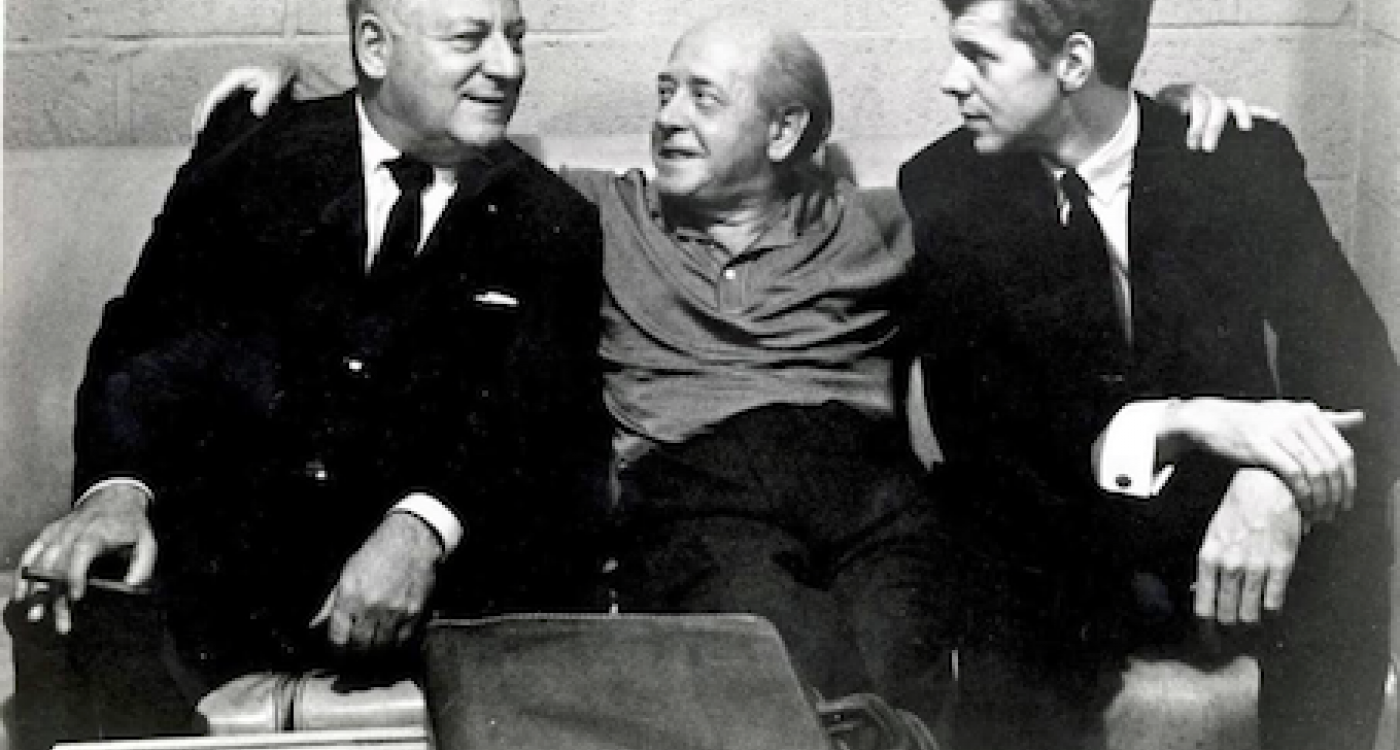The Man Behind the Mann

Though stadiums and concert halls are often renamed to advertise wealthy donors, I’d rather see a name related to a place’s use: The Academy of Music, Philharmonic Hall. An exception is Fredric R. Mann who, quite properly, deserves to have his impressive achievements in Philadelphia, and specifically its summer music scene, honored.
Fredric Mann, Eugene Ormandy and Van Cliburn. (Photo courtesy of the Mann Center) As the Mann Center in Fairmount Park marked its 40th anniversary this summer, I fear many of its patrons don't know about the man who made it possible. His last staff associate at the Center, Jerry Grabey, retired this month, and details of Mann’s achievements are growing dimmer for this generation. Few remain who can tell his story.
Tough exterior, tender interior
Burly, with a gruff voice, wearing heavy tortoiseshell eyeglasses and smoking cigars, Mann seemed intimidating. But his close friends called him Freddie, and under the brash exterior was a young soul with childlike wonderment for music and art.
Born in Russia in 1903 and brought to the United States as an infant, Mann made a fortune in his 20s, founding a company that made cardboard boxes. From childhood, Mann's principal interest was classical music, and he used his wealth to support artistic endeavors. Musical programs were staged in the sylvan Robin Hood Dell in the eastern part of Fairmount Park from 1930 onward. But by 1949, those concerts were in financial trouble.
Mann organized a group of 100 philanthropists who pledged money, he talked the city of Philadelphia into matching their contribution, and the Philadelphia Orchestra was presented free to the public. It was a tremendous success. Countless students in the 1950s and ‘60s flocked to these concerts.
The only problem was weather. Although the orchestra was in a shell, the audience was unsheltered, and many concerts were rained out. Guest soloists had to stay in Philadelphia for an extra day or two while everyone hoped the concert could be rescheduled (and the following concert re-booked).
Therefore Mann led the establishment of a new facility on the western side of the Schuylkill River. This was named the Mann Music Center, and appropriately so. He was in complete command of its financial and artistic matters until his death from cancer in 1987. Mann would be chagrined by the current lineup of events in his Center. He was a strictly a classical guy, who trained as a pianist, but whose career was cut short when he suffered a shoulder injury in a bicycle accident.
Keeping his name alive
For years after his death, his widow Silvia attended every concert, easily recognized by her flaming red hair. "I want people to notice me," she told me in 2001, "and I want young people to say: ‘Who is that lady?’ so someone can answer: ‘Her husband built this place.’ That’s how I keep Fred’s name alive." Silvia died in 2008 at age 96.
Mann and Silvia were raconteurs bursting with stories of their musical adventures. Incredibly, Mann rescued people fleeing Nazi Germany in the 1930s, helped establish the Israel Philharmonic, and its hall in Tel Aviv is named for him. Polish-born pianist Arthur Rubinstein could not get entry into the United States when Germany invaded Poland in 1939 because the allotted quota from that nation was filled. So, Rubinstein went to Mexico and Mann stayed with him there while arranging for Rubinstein’s entry into the United States as a Mexican resident. During their time in a border town, Mann and Rubinstein hung out at a tavern and took turns playing its piano. Unknowing bar patrons would often tip them.
He played on twin grand pianos with his famous friends in his home at the Barclay, overlooking Rittenhouse Square. He also sponsored the careers of Zubin Mehta, Itzhak Perlman, Daniel Barenboim, and the pianist William Kappell, who died in a 1953 plane crash.
A man of service
Mann served as Philadelphia’s director of recreation and director of commerce. He was experienced in dealing with heads of state and with presidential candidates, but one individual bothered him. In 1979, attorney Roy Cohn came to Mann’s office to talk about a lawsuit involving an appearance by pianist Vladimir Horowitz. Cohn was the attack dog for Senator Joseph McCarthy and had been tried and acquitted of federal charges of conspiracy, bribery and fraud. For this meeting, Mann insisted that his aide, Grabey, be in the room to witness whatever was negotiated. At the end of the meeting, Grabey said he wanted to go into the bathroom to wash the dirt off his hands. “Me first,” responded Mann.
Mann was a liberal and a Democrat who despised Cohn. He was an early supporter of John F. Kennedy, and Lyndon Johnson appointed him ambassador to Barbados, where he served until the end of the Johnson administration.
In 1983, Mann explained how he used his wealth: “The Hebrew word for charity is tzedakah, which really means justice. If you live opulently, you have to share with the less fortunate.”